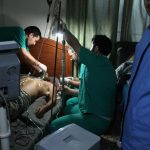For Dr. Mohammad, there is nothing abstract about the Syrian government and Russian military offensive on the last rebel-held tract of territory in Syria’s northwest. As a physician managing a hospital in the town of Darat Izza, western Aleppo, he’s experiencing it first-hand in all its cruelty.
“It’s a peculiar feeling, knowing that in a matter of seconds, a missile will land on you,” Dr. Mohammad told me during a call about a recent attack on his hospital. “As you’re waiting for death you pray, and you look around. You see one colleague covering his head with his bare hands to shield himself from the rubble that’s about to fall. Another is hugging a wall so closely she’s almost melting into it. And you’re standing there, utterly powerless.”
What Dr. Mohammad described next is all too familiar to so many of those who have worked and continue to work on providing health care in opposition-controlled areas of Syria. A series of explosions in quick succession, screams, dust, and destruction. Another hospital taken out. Another area starved of desperately needed medical services.
“As you’re waiting for death you pray, and you look around. You see one colleague covering his head with his bare hands to shield himself from the rubble that’s about to fall. Another is hugging a wall so closely she’s almost melting into it. And you’re standing there, utterly powerless.”
Dr. Mohammad
PHR has documented 595 such attacks since 2011. In 595 separate instances, hospitals, clinics, vaccination centers, and other medical structures were attacked and put out of service in violation of the most basic international norms. The Syrian government and Russia are responsible for more than 90 percent of those attacks.
For the past 10 months, the Syrian government and its Russian backer have ramped up this targeted destruction – among a slew of other criminal tactics – as they have pounded their way into the northwest. True to form, they have pursued a strategy of territorial conquest with maximum civilian pain at its core. They have deliberately bombed residential areas, hospitals, and other vital infrastructure to drive civilians out of their towns and incrementally recapture territory.
The human toll of this grueling ground offensive has been extreme. Since the beginning of December 2019, an estimated one million people – 80 percent of whom are women and children – have been driven from their homes toward the Turkish border. This figure represents the largest wave of displacement since the conflict began in 2011. This exodus ranks among the greatest the world has seen in recent times, drawing parallels with the mass flight of the Rohingya from Myanmar in 2017. The estimated three million people living in the northwest are being crowded into a rapidly shrinking area between a maniacal Syrian government on one side and a sealed Turkish border on the other.
The situation in northwest Syria has all the makings of an unparalleled humanitarian disaster. Yet the world has chosen to turn away from this deliberate tragedy with callous indifference. Russian and Chinese vetoes have stymied meaningful action by the United Nations Security Council (UNSC) and effectively paralyzed substantive UN action to stop these crimes or to offer the Syrian people a humanitarian lifeline.
Even worse, UN passivity in the face of the horrors unfolding in Idlib extends to the office of UN Secretary-General António Guterres. Nowhere has this been more evident than Guterres’s failure to denounce the Syrian and Russian governments for their relentless, unlawful assault on civilians in Idlib during his February 21 press conference. Instead, Guterres spoke of “international humanitarian law and the protection of civilians [that] have been systematically ignored,” without specifying the perpetrators of those violations.
Three days after this dismal performance, Guterres repeated his unwillingness to publicly condemn UN member states implicated in gross human rights violations in his issuance of a so-called “call to action for human rights” from Geneva. The only apparent reference to the carnage in Syria’s northwest was a cursory comment on “civilians being trapped in war-torn enclaves.” It’s clear that the voice and prayers of Dr. Mohammad in Darat Izza aren’t reaching the halls of the United Nations. Nor are the voices of the millions of Syrian civilians whose lives are currently in the balance in Idlib and western Aleppo.
Guterres can’t change the dynamics of the UNSC that give China and Russia veto power over substantive UN action to protect the people of Syria. But he can and should move from his current entanglement in futile risk-aversion to direct confrontation with the perpetrators of human rights violations. He should bring the full weight of his title and his office to bear by speaking out about the plight of Dr. Mohammad and the millions of other civilians in Idlib in imminent risk of death, injury, or dislocation.
Guterres repeated his unwillingness to publicly condemn UN member states implicated in gross human rights violations
That shift should start with publicly scorning the perpetrators of those atrocities. Guterres has an opportunity to do so at the end of the week when his office receives the results of the findings of the UN Board of Inquiry into “destruction of, or damage to, facilities on the UN deconfliction list and UN-supported facilities” in northwest Syria. Guterres should make those results public and ensure that they name the parties responsible for those attacks. The evidence of Syrian government and Russian culpability for the perpetration of intentional and egregious crimes is out there and has been reported by multiple credible sources, including Physicians for Human Rights. Not attributing responsibility will be a gross betrayal of the patients, health care workers, and staff of humanitarian organizations who have died or suffered in the wake of these attacks. It will also ensure that the Syrian and Russian governments continue to lay waste to northwest Syria with utter impunity and at a cost of more displacement, suffering, and death of Syrian civilians.

